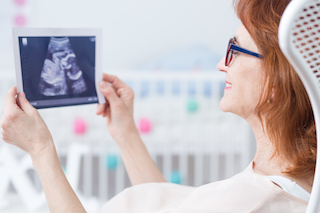 The average age of women giving birth is on the rise. Most countries participating in the Organization for Economic Cooperation and Development (OECD) experienced a two to four-year increase in the mean age of women giving birth. At the same time, adolescent fertility rates remain high in low and middle-income countries.
The average age of women giving birth is on the rise. Most countries participating in the Organization for Economic Cooperation and Development (OECD) experienced a two to four-year increase in the mean age of women giving birth. At the same time, adolescent fertility rates remain high in low and middle-income countries.
A new study published in the Journal of Psychiatry Investigation examined the impact of age at childbirth on the maternal mental health of premenopausal women in Korea.
“We were interested in the delay in the age of childbirth of women and wondered if their childbirth age affected their mental health,” study author Soo-Hyun Joo told us. “We also thought this is very important, psychiatrically and socially, so we wanted to determine whether there was an association between age at first or last childbirth and the mental health of premenopausal women.”
South Korea has experienced an increase in the mean age of all women giving birth from 30.22 years in 2005 to 32.04 years in 2014. A previous study found that mothers in older age groups (i.e. those older than 38 years) reported significantly more depressive symptoms and fewer expressed warmth towards their partner as compared with their counterparts in the younger group.
“We hypothesized that younger age at first childbirth or older age at last childbirth would negatively impact maternal mental health," Joo told us. "Women who gave birth at a younger age were less likely to maintain a good academic status or career, which can lead to low self-esteem, low satisfaction, and economical difficulties. This increases the likelihood of mental health problems for women who gave birth to their first child at a younger age."
On the other hand, explained study researcher director, Tae-Suk Kim, older mothers are more likely to feel deprivation due to delayed childbirth and parenting than their peers. This also increases the likelihood of maternal mental health problems.
“Given the demographic shift, we are interested in the effect of advanced or delayed maternal age at the time of childbirth on maternal mental health,” Kim told us. “A few studies to date have assessed the association between maternal age at childbirth and maternal mental health, however, most studies have reported on the effects of maternal age on their children.”
The study was conducted based on the data from the fifth Korea National Health and Nutrition Examination Survey, a series of nationwide cross-sectional studies aimed at summarizing the health of a nationally representative, non-institutionalized sample of Korean residents. Among all of the individuals who participated in the survey, the current study included female subjects aged 19 years of age or older. A total of 3,370 premenopausal women were included in the final analysis. Researchers analyzed associations between maternal mental health and childbirth age after adjust several factors potentially affecting depression or suicide risk such as age, lifestyle factors (e.g., smoking, alcohol consumption, regular exercise, body mass index, education, income level, and marital status), and reproductive factors (e.g., number of births, age at first and age at last childbirth).
“The principal findings are that younger age at the time of first childbirth is associated with an increase in maternal depressed mood and suicidal ideations and that older age at the time of last childbirth is associated with an increase in maternal stress, depressed mood and suicidal ideations in pre-menopausal women, respectively,” Kim told us. “This study suggests that maternal childbirth age may have a direct or indirect negative effect on the mental health of pre-menopausal women.”
Additionally, researchers found that women who experienced their first childbirth under the age of 19 had a lower education level, income and spouse while the number of births were higher than women who experienced their first childbirth over the age of 20. Also, women who experienced their last childbirth over the age of 40 had a lower income while a higher number of births than women who experienced their last childbirth under the age of 39.
“This is the first study to investigate the relationship between maternal mental health and maternal age at first and last childbirth,” Kim told us. “In particular, the present study could provide important information when researching women’s mental health in OECD countries, where the childbirth age of women is increasing. We can find out both younger maternal age at first childbirth and older maternal age at last childbirth may be risk factors for poor outcomes of premenopausal women’s mental health including depression and suicide.”
Kim and Joo believe the results of their study supports the need for comprehensive mental health assessment in women who give birth either too young or too old.
“Women who experienced childbirth under the age of 19 or over the age of 40 need more social attention,” Joo told us. “Further prospective cohort studies investigating the causal relationships between childbirth age and maternal mental health are also needed.”
Patricia Tomasi is a mom, maternal mental health advocate, journalist, and speaker. She writes regularly for the Huffington Post Canada, focusing primarily on maternal mental health after suffering from severe postpartum anxiety twice. You can find her Huffington Post biography here. Patricia is also a Patient Expert Advisor for the North American-based, Maternal Mental Health Research Collective and is the founder of the online peer support group - Facebook Postpartum Depression & Anxiety Support Group - with over 1500 members worldwide. Blog: www.patriciatomasiblog.wordpress.com
Email: tomasi.patricia@gmail.com